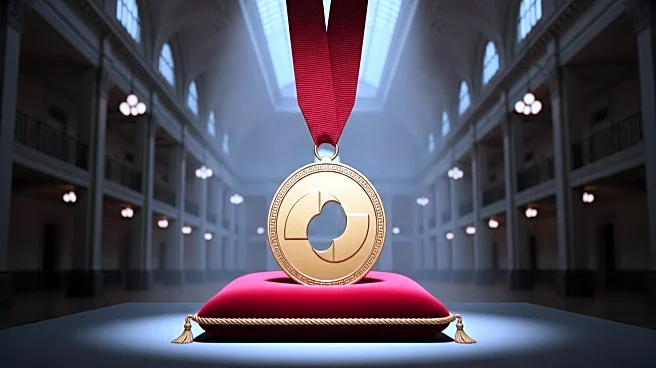What's Happening?
President Isaac Herzog has announced the recipients of the 2025 Israeli Presidential Medal of Honor, recognizing nine individuals for their significant contributions. Among the honorees are Dr. Miriam Adelson, known for her philanthropic efforts and influence in Israeli society, and Sheikh Muwaffaq Tarif, a spiritual leader of Israel's Druze community. The award ceremony highlights the diverse contributions of these individuals, ranging from combating antisemitism to supporting the State of Israel. The Presidential Medal of Honor is one of the highest civilian awards in Israel, celebrating those who have made impactful contributions to the nation and its values.
Why It's Important?
The recognition of these laureates underscores the importance of diverse contributions to Israeli society and the global community. Dr. Miriam Adelson's work in philanthropy and her influence in Israeli affairs exemplify the role of private individuals in shaping public policy and societal values. Sheikh Muwaffaq Tarif's leadership within the Druze community highlights the significance of cultural and religious diversity in Israel. The awards serve as a reminder of the ongoing efforts to combat antisemitism and promote peace and unity within the region. These honors not only celebrate individual achievements but also encourage continued efforts towards societal betterment.
What's Next?
The award ceremony is expected to foster further dialogue and collaboration among the honorees and their respective communities. It may inspire other leaders and individuals to engage in activities that promote peace, unity, and cultural understanding. The recognition could also lead to increased visibility and support for the causes championed by the laureates, such as combating antisemitism and fostering interfaith dialogue. As these individuals continue their work, their influence may extend beyond Israel, impacting global discussions on these critical issues.
Beyond the Headlines
The awarding of the Presidential Medal of Honor to figures like Dr. Miriam Adelson and Sheikh Muwaffaq Tarif highlights the intersection of philanthropy, cultural leadership, and political influence. It raises questions about the role of private individuals in public affairs and the impact of cultural leaders in shaping national identity. The recognition of these diverse contributions may encourage broader discussions on the integration of minority communities and the importance of cultural diversity in national policy.









